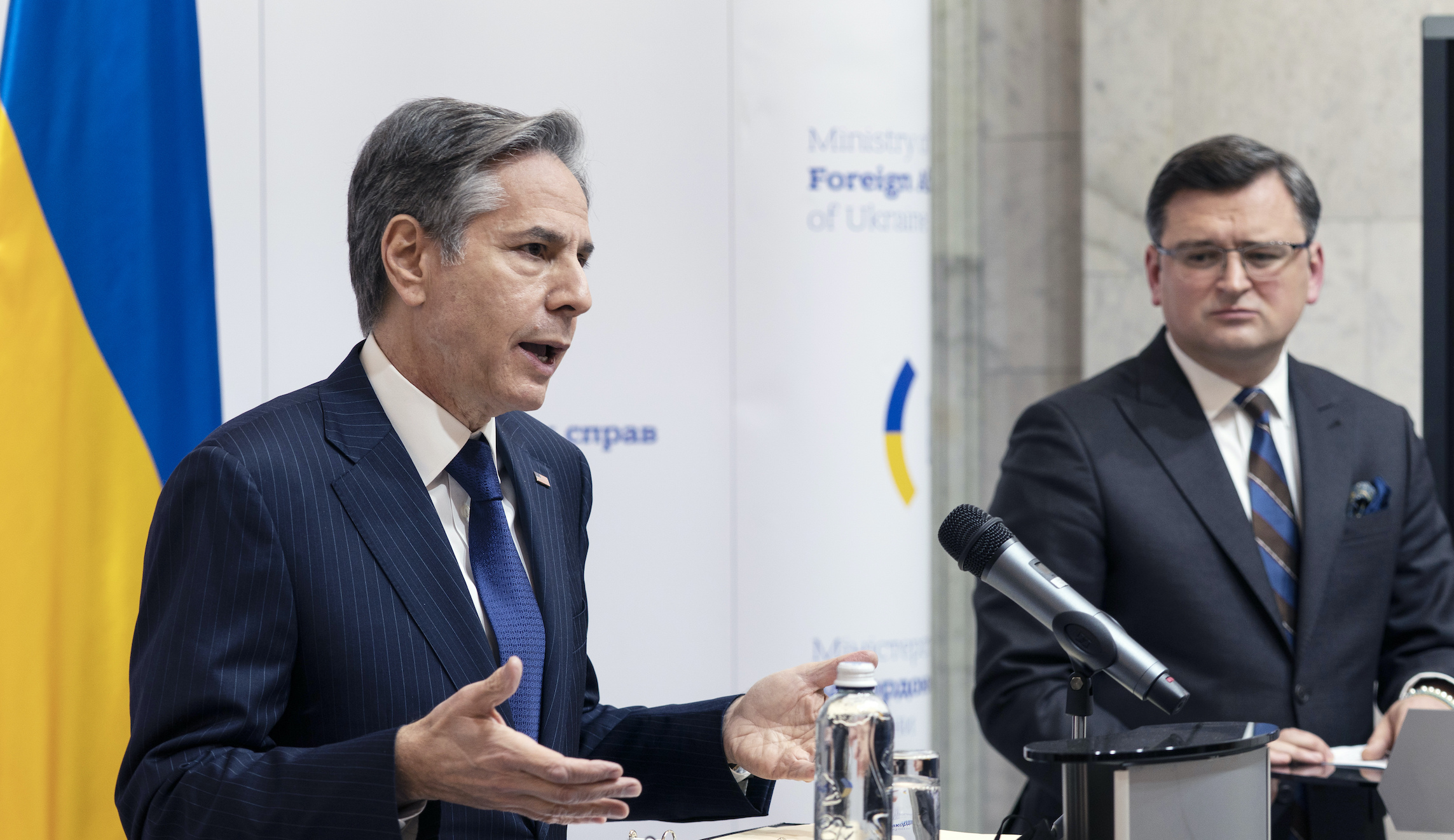Secretary of State Antony Blinken and Ukrainian Foreign Minister Dmytro Kuleba rendezvoused at a Ukrainian town on the Polish border Saturday.
The conference took place as Ukrainian officials pleaded for new anti-aircraft defenses to fend off Russian airstrikes amid soaring civilian death tolls. A report by the United Nations’s human rights office said there have been more than 1,000 civilian casualties since Russian President Vladimir Putin launched a massive invasion to overthrow Ukrainian President Volodymyr Zelensky.
“It’s no secret that the highest demand that we have is in fighting jets, attack aircrafts, and air defense systems,” Kuleba said during a joint press appearance with Blinken. “We need to, how to say, big air defense systems to ensure the safety of our skies. If we lose the skies, there will be much, much more blood on the ground, and that will be the blood of civilians.”
Blinken, the top diplomat in the Biden administration, and a bipartisan bloc of U.S. lawmakers descended on the border to show solidarity with Ukraine and the refugees fleeing the violence as Ukrainian officials and observers vented their frustration, saying that Putin has succeeded in deterring NATO allies from providing more effective support to Ukraine.
ZELENSKY BEGS US FOR FIGHTER JETS AND A RUSSIAN OIL EMBARGO
“The pressure on Russia, not only is it unprecedented, not only is it producing very, very concrete results in Russia, but that pressure too will not only continue — it will grow until this war, this war of choice, is brought to an end,” Blinken said, adding that he is “in awe” of Zelensky and his team. “The courage that they are showing every day, the leadership that they are showing to the world, it’s inspiring. And the world is here; the world is with you.”

Kuleba thanked Blinken for the U.S. support given thus far, but neither the Ukrainian envoy nor Blinken’s other interlocutors suppressed their scorn for NATO’s refusal to impose a no-fly zone over Ukraine — a measure that Western officials fear would risk a direct war with Russia that could escalate into a nuclear conflict.
“I think it’s a sign of weakness [from] NATO,” Kuleba told reporters while standing next to Blinken. “It’s the people of Ukraine who pay the price for the reluctance of NATO to act.”
Blinken received a similarly bracing message in a meeting with a prominent Ukrainian anti-corruption activist who has worked with officials at the U.S. Embassy in Kyiv. “When we became successful, Putin decided to execute Ukrainians for this,” Daria Kaleniuk wrote on Twitter. “I told [Secretary Blinken] today that I don’t believe in rule of law any more if the US is not providing us help to [protect Ukraine’s sky] to win the war.”
The United Nations High Commissioner for Human Rights has documented the deaths of 351 civilians and 707 people injured in Ukraine.
“Most of the civilian casualties recorded from 4 am on 24 February 2022 until 12 midnight on 4 March 2022, were caused by the use of explosive weapons with a wide impact area, including shelling from heavy artillery, multi-launch rocket systems, and missile and air strikes,” the U.N. office said before acknowledging the likelihood that “the real figures are considerably higher, especially in [Ukrainian] government-controlled territory.”
CLICK HERE TO READ MORE FROM THE WASHINGTON EXAMINER
Kuleba surmised the United States and other members of NATO will prove more willing to increase Western aid to Ukraine as civilian casualties mount.
“And if our partners continue to take bold, systemic decisions to step up economic and political pressure on Ukraine, if they continue to provide us with necessary weapons, the price will be lower,” he said. “We are now in the phase where NATO is saying: No, we’re going to not — we are not going to do that. The time will come. It’s, again, the issue of price.”

